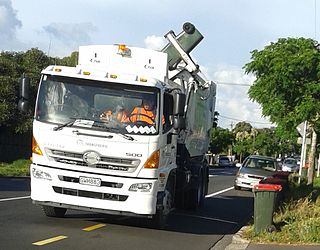Related Research Articles
Environment and Climate Change Canada, is the department of the Government of Canada responsible for coordinating environmental policies and programs, as well as preserving and enhancing the natural environment and renewable resources. It is also colloquially known by its former name, Environment Canada.

The Convention on the Prevention of Marine Pollution by Dumping of Wastes and Other Matter 1972, commonly called the "London Convention" or "LC '72" and also abbreviated as Marine Dumping, is an agreement to control pollution of the sea by dumping and to encourage regional agreements supplementary to the Convention. It covers the deliberate disposal at sea of wastes or other matter from vessels, aircraft, and platforms. It does not cover discharges from land-based sources such as pipes and outfalls, wastes generated incidental to normal operation of vessels, or placement of materials for purposes other than mere disposal, providing such disposal is not contrary to aims of the Convention. It entered into force in 1975. As of September 2016, there were 89 Parties to the Convention.

Alexander Dennis is a British bus manufacturing company based in Larbert, Scotland. The largest bus and coach manufacturer in the United Kingdom with a 50% market share in 2019, it has manufacturing plants and partnerships in Canada, China, Europe, Hong Kong, Malaysia, New Zealand, Singapore, South Africa and the United States.
Articles related to waste management include:

Waste minimisation is a set of processes and practices intended to reduce the amount of waste produced. By reducing or eliminating the generation of harmful and persistent wastes, waste minimisation supports efforts to promote a more sustainable society. Waste minimisation involves redesigning products and processes and/or changing societal patterns of consumption and production.

Construction waste or debris is any kind of debris from the construction process. Different government agencies have clear definitions. For example, the United States Environmental Protection Agency EPA defines construction and demolition materials as “debris generated during the construction, renovation and demolition of buildings, roads, and bridges.”

WRAP is a British registered charity. It works with businesses, individuals and communities to achieve a circular economy, by helping them reduce waste, develop sustainable products and use resources in an efficient way.

Waste Connections of Canada is a garbage collection company, providing non-hazardous solid waste collection, recycling, composting, renewable energy production and landfill disposal services to commercial, industrial, municipal and residential customers. In 2016, Progressive Waste Solutions merged with Waste Connections, Inc. (TSX/NYSE) becoming the third largest solid waste management company in North America with a network of operations in 39 states and five provinces. In Canada, operations were rebranded to Waste Connections of Canada and Enviro Connexions.
The CSIR-National Environmental Engineering Research Institute (CSIR-NEERI) is a research institute created and funded by Government of India. It was established in Nagpur in 1958 with focus on water supply, sewage disposal, communicable diseases and to some extent on industrial pollution and occupational diseases found common in post-independent India. NEERI is a pioneer laboratory in the field of environmental science and engineering and part of Council of Scientific and Industrial Research (CSIR). NEERI has five zonal laboratories at Chennai, Delhi, Hyderabad, Kolkata and Mumbai. NEERI falls under the Ministry of Science and Technology (India) of the central government. The NEERI is an important partner organisation in India's POPs national implementation plan (NIP).
This is a glossary of environmental science.

The natural environment, commonly referred to simply as the environment, includes all living and non-living things occurring naturally on Earth.

Demolition waste is waste debris from destruction of buildings, roads, bridges, or other structures. Debris varies in composition, but the major components, by weight, in the US include concrete, wood products, asphalt shingles, brick and clay tile, steel, and drywall. There is the potential to recycle many elements of demolition waste.

The Hillcrest Centre is a community centre with ice hockey and curling rinks, and an aquatics facility, located at Hillcrest Park in Vancouver, British Columbia, Canada. Construction started in March 2007; it hosted the 2009 World Junior Curling Championships prior to the Olympics. During the 2010 Olympics, it was named the Vancouver Olympic/Paralympic Centre and had a capacity of 6,000 people to host curling at the 2010 Winter Olympics; for the 2010 Paralympics, it hosted the Wheelchair Curling event.

The management of waste in New Zealand has become more regulated to reduce associated environmental issues. According to OECD data, New Zealand is the third most wasteful country in the OECD.

Demolition is the science and engineering in safely and efficiently tearing down of buildings and other artificial structures. Demolition contrasts with deconstruction, which involves taking a building apart while carefully preserving valuable elements for reuse purposes.

The Lagos Waste Management Authority (LAWMA) is a parastatal of the government of Lagos State responsible for managing waste generated in Lagos state through a waste collection, transportation and disposal structure. The goal of Lagos waste management authority is to improve the environment with the impact of achieving positive and significant change in living conditions regarding health and sanitation.
George Fleming is a Scottish civil engineer specialising in environmental issues. Educated at the Royal Technical College, Stanford University and the University of Strathclyde he is a doctor of philosophy. His research started with studies of the hydrology of the River Clyde that expanded to a range of subjects including, dredging, nuclear waste management, decommissioning of North Sea platforms and contaminated land. He has written reports on flooding for the Institution of Civil Engineers and the British government. Fleming was involved in the planning stages of the Glasgow Garden Festival of 1988 and established a way of reusing dredgings from the Clyde to provide topsoil for the event. He has since licensed the technology commercially. He has served as a non-executive director of British Waterways, Port of Tyne boards and for WRAP, a government quango whose aim was to promote recycling and resource efficiency. He is founder and chairman of the EnviroCentre environmental consultancy, of which his son is now managing director.

Waste management in South Korea involves waste generation reduction and ensuring maximum recycling of the waste. This includes the appropriate treatment, transport, and disposal of the collected waste. South Korea's Waste Management Law was established in 1986, replacing the Environmental Protection Law (1963) and the Filth and Cleaning Law (1973). This new law aimed to reduce general waste under the waste hierarchy in South Korea. This Waste Management Law imposed a volume-based waste fee system, effective for waste produced by both household and industrial activities.
References
- ↑ EnviroCentre Ltd. "A Report on the Demolition Protocol" (PDF).
- ↑ "Demolition Protocol - production".